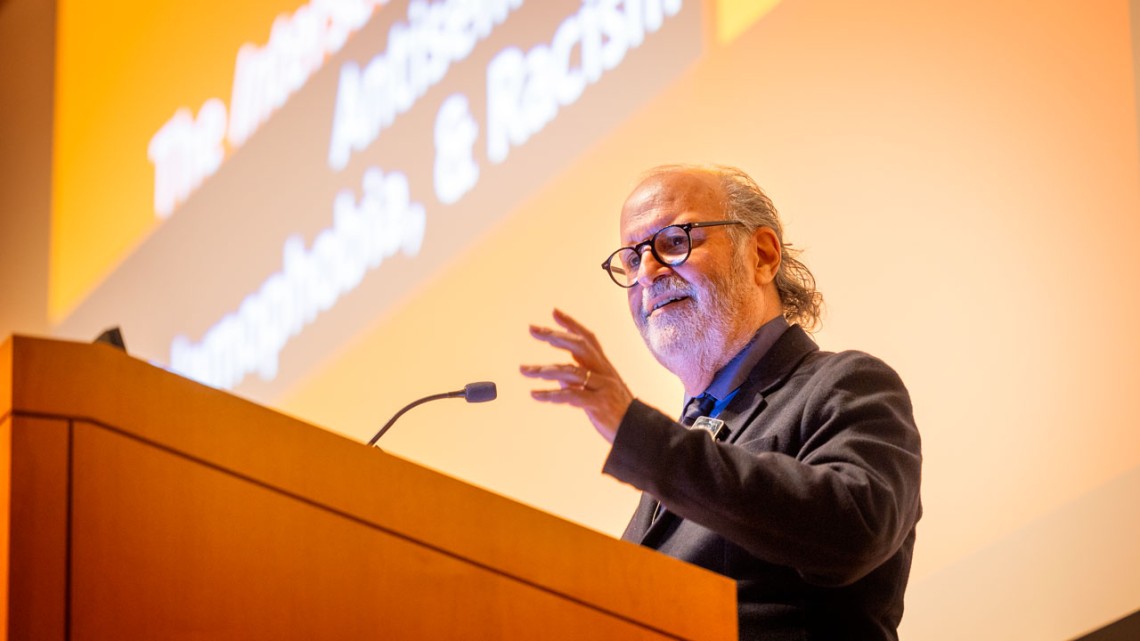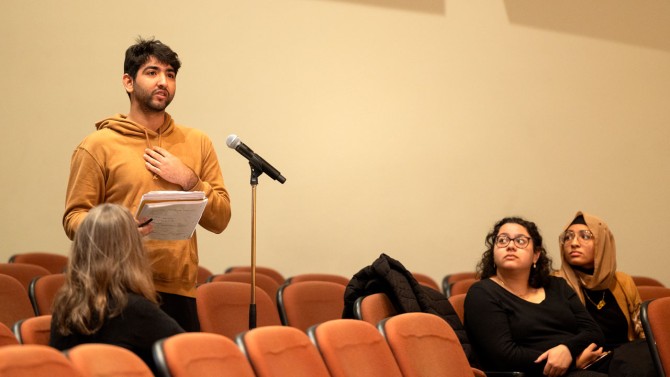
Ross Brann, the Milton R. Konvitz Professor of Judeo-Islamic Studies & Stephen H. Weiss Presidential Fellow in the College of Arts and Sciences, gives a talk titled “The Intersectionality of Antisemitism, Islamophobia and Racism” on Nov. 16 in the Alice Statler Auditorium in Statler Hall.
Talk explores connections of antisemitism, Islamophobia, racism
By Holly Hartigan, Cornell Chronicle
The tropes tying together religion and race are carved into human history.
Racist depictions of the behavior and appearance of Jews and Muslims encouraged ancient peoples to view them as others, and those same tropes continue to reinforce divisions today, said Ross Brann, the Milton R. Konvitz Professor of Judeo-Islamic Studies and Stephen H. Weiss Presidential Fellow in the College of Arts and Sciences, in a talk held Nov. 16 in the Alice Statler Auditorium in Statler Hall.
“We find evidence of antisemitism and Islamophobia in every domain of the historical record,” he said. “You don’t have to look very hard or go very far to find evidence of these [hatreds], whether within the matrices of competition over scarce resources, or efforts to police and reinforce boundaries of exclusive identities … particularly in pre-modern times.”
Brann talked about how the figures of Jewish, Muslim and nonwhite people have been the objects of hatred and fear for more than 2,000 years during the talk, titled “The Intersectionality of Antisemitism, Islamophobia and Racism.” More than 1,600 people viewed the livestreamed talk, which can be viewed on eCornell’s website.
After an introduction by President Martha E. Pollack, Brann explored how antisemitism and Islamophobia are defined by the ideas of Jews and Muslims rather than actual understanding of Judaism and Islam.
Brann cited written records of hatred against Jews that date to the 4th century BCE, and hatred against Muslims dating to the founding of Islam in the 7th century. Moving forward in history, Islamophobia and antisemitism became intertwined, he said, by common people who lived in a constant state of anxiety and fear of divine punishment in times of economic and political upheaval.
“With the encouragement of the elites, they projected these anxieties onto their religious others, namely, the Jews and the Muslims for their powerful devilry, their sorcery, the association with the Antichrist,” Brann said. “And this provided a theory of everything – as we say today – a convenient explanation for all of the world’s many travails and ills.”
Starting with just the concept of what a group is like rather than actual understanding has led to dehumanization and fear. With those conceptions, “you don’t need to read a text or listen to a sermon, or have any other kind of experience with someone, but if you see what they eat, or how they look, or other bodily practices, you’re going to take note of that, and if it’s different the tendency is to treat difference with not just curiosity but with fear. This is where [hatred] starts,” he said.
Education is key to dispelling the ancient tropes and myths of “others,” he said.
“What we do here at Cornell is one of the best tools that I know … to educate people, to encourage people to look at things differently – not always in accordance with their presumptions that they brought to the table – and to learn from others, even more than they might learn from any classroom teacher,” Brann said.
A Q&A with the in-person audience followed the talk.
The talk was sponsored by the Office of the Provost; the Provost’s Office of Faculty Development and Diversity; the College of Arts and Sciences; the departments of Near Eastern studies, government, history and anthropology; the Religious Studies Program; the Jewish Studies Program and the Comparative Muslim Societies Program in the Mario Einaudi Center for International Studies.
Media Contact
Get Cornell news delivered right to your inbox.
Subscribe

